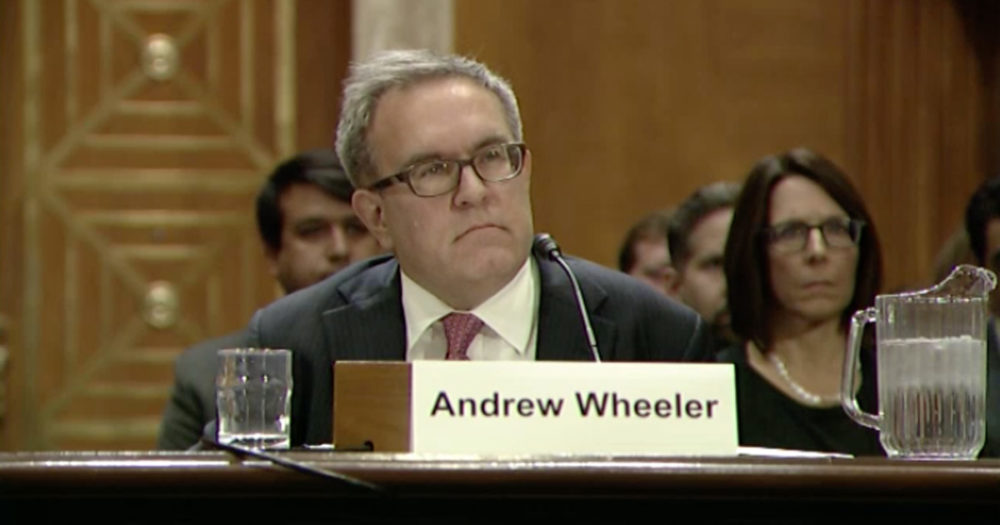On Monday, I met with Andrew Wheeler, the acting administrator of the Environmental Protection Agency (EPA), accompanied by Andy Rosenberg, director of our Center for Science and Democracy, and Michelle Robinson, director of our Clean Vehicles Program. We had asked for this meeting in early July, just after Scott Pruitt resigned and Mr. Wheeler was named as his replacement. Though well aware of Mr. Wheeler’s history as a coal industry lobbyist, we hoped that he might not be personally invested in some of Mr. Pruitt’s policies, and were convinced that we should meet with him face to face and try to persuade him to change course.
Since that time, and with a few important exceptions, Mr. Wheeler has mostly dashed these hopes. During his short tenure, the EPA has drafted rules to roll back the three most significant EPA climate change policies (fuel economy and greenhouse gas emissions standards for cars and light-duty trucks, the clean power plan for CO2 emissions from power plants, and limits on methane leaks from oil and gas operations). And the EPA has repeatedly excluded independent, academic scientists from EPA advisory boards and has sought to limit the scientific information that the EPA can use when adopting new safeguards for public health and the environment.
We were scheduled for a half hour, but Mr. Wheeler graciously extended the time to make sure we could cover the three issues we wanted to raise. At the meeting, Mr. Wheeler, accompanied by Bill Wehrum, the director of Air and Radiation, and several others, was engaged, eager to defend his positions, and respectful of ours.
However, the meeting was utterly disappointing.
We focused part of the discussion on climate change. We handed them excerpts from the recent report by the Intergovernmental Panel on Climate Change (IPCC), and the Climate Science Special Report, prepared by US government scientists. We showed them a chart from the Special Report projecting the misery of lengthy heat waves across the US in just a few decades, and cited UCS’s Underwater Report estimating that hundreds of thousands of homes in the United States that would be flooded twice a month by mid-century. We stated as forcefully as we could that rolling back the modest first steps that the EPA had taken is the precise opposite of what these reports are urgently calling upon all leaders to do.
Mr. Wheeler did not attempt to dispute the science. Rather, he claimed that EPA lacked the legal authority to address it in any substantial way, particularly when it came to power plants. We pushed back hard, citing several Supreme Court opinions holding that the EPA did have such authority and pointing out that the EPA had itself created uncertainty over its authority by asking a court not to rule on a pending case on the Clean Power Plan which would have clarified the legal boundary lines. I felt the way Abraham Lincoln must have when he ruminated “If General McClellan isn’t going to use his army, I’d like to borrow it for a time.”
We also discussed the rollback of the clean car standards, and Mr. Wheeler seemed to have swallowed the argument that cleaner car standards will cause more traffic fatalities. (I know, this is hard to grasp—supposedly people will hold on to their less safe, older cars longer and drive them more because newer, more efficient cars are more expensive). Michelle pointed out that even his own technical staff’s analysis doesn’t support this argument, and let him know that we and others would refute it during the public comment period. We also discussed the proposal to rescind California’s long-standing authority to set its own stricter standards. At this point, Mr. Wheeler expressed a preference for a “50 state” solution in which the federal and state standards were aligned. We reminded him that this is precisely what we have now under the existing standards, and it is his decision to lower the federal standards that is creating a disjunction with California.
The discussion then turned to science, and Andy spoke forcefully about a pattern of removing independent, academic scientists from advisory boards, and limiting the evidence that EPA can consider when making decisions. UCS and the EPA could not even agree on what to call one of the proposals that would disallow the EPA from using studies unless it made public raw data such as private health records. We called that proposal “restricted science.” He called it “transparent science.” Whatever the name, Mr. Wheeler did recognize that his proposal had engendered fierce criticism from many quarters, but he insisted that it was misunderstood.
The meeting was coming to a close. I had been in this office before with other EPA administrators, and had experienced the exhilarating feeling of being close enough to power for my words to make a difference. The stakes for this meeting with Mr. Wheeler were so much higher—we are running out of time on climate change, and the Trump administration is doing such damage, yet I couldn’t break through.
As a last resort, I did all I could do: I implored him to read the reports we provided and summon the courage to put a hold on these reckless rollbacks. I acknowledged that this would be hard. And I said something like this: “it would be harder still to be a person in a unique position of authority and responsibility, who had the chance to steer a safer course, but chose not to do so.”

